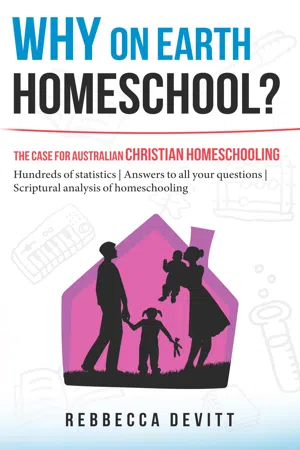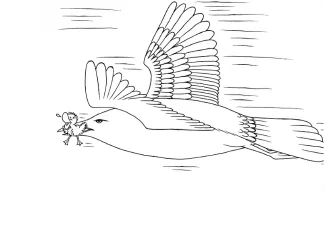![]()
PART 1: WHAT IS WRONG WITH SCHOOLS
![]()
1. ARE SCHOOLS THAT GREAT?
WHY ARE YOU READING THIS BOOK? If you were to think about it, you would soon conclude pleasure or fear primarily drives your choice. These feelings drive many of our decisions in life, including our decision to send our child to school or educate them at home.
Many parents are motivated to homeschool because of the pleasure of spending more time with their children, whose company they enjoy. Other parents pray for school holidays to end. Some may prefer the comforts of a second income, while others are busy with running the household or choose ‘me’ time while their children are at school.
Pleasure is powerful, but not as powerful as fear. Fear can also drive the decision to school or homeschool. Some choose to homeschool because they fear their child may be bullied. Others have experienced pain themselves while going through the education system or have watched their children come home bullied or discouraged by staff or students at school. And then there are those who see the declining moral influences on children in schools and fear their own children would be affected. On the other hand, there are mothersi who actively choose school because they fear a loss of their independence and career identity through being ‘just a Mum’. They may also fear homeschooling, thinking it may breed illiterate, bubble-wrapped children.
While fear is not generally considered to be a successful motivator, it can be a good thing if it alerts us to danger. It can also help us recognise the foolishness of one action and choose the wisdom of another. When fear is blinding, our emotions can lead us into bad decisions, but if we examine our fear in light of scripture, godly advice and prayer, it can have a positive effect and lead us to wise decisions.
Of course, fear may not come into it at all for some parents because they may have enjoyed their school experience and simply realised that school barely, if ever, taught them scripturally. They recognised school was plenty of fun, yet a great distraction from Christianity. Fitting in with the crowd meant a loss of personal identity and a gain of group identity – an identity tied to the central beliefs of the group.
But, this loss of personal identity stems from a loss of national identity in Christ. As we’ve thrown God out, we’ve thrown out a lot of Christian education, which benefits our school students personally. Although schools weren’t originally designed to facilitate ungodliness, schools became effective tools for spreading ungodliness.
This spread came as universities stopped preaching the Bible and gradually became enraptured with humanistic ideals and offended by biblical ideals. In this chapter, we will be going back to the basics, examining what teachers now learn regarding school. We will see how the big thinkers and shakers of education have shaped our institutions to reflect ungodly ideals and practices. This book will show why masses of Christian parents are leaving schools in favour of homeschooling.
The Origins of Modern Education
Although this book is about Australian Christian education, Australia’s educational theories originated from other countries, notably Greece, France and England. Some theories, like Plato’s theories, are extremely ancient and originate from non-Christian roots. Due to these influences, Christian Australia has slowly become secularised and removed Christian thinking from its schooling. Therefore, many Christian homeschooling parents have turned from schools because schools have, in many cases, turned from God.
As the culture has changed, teachers turned from accepted biblical mandates to unstable, man-made theories. Australians gradually dropped Christian education and simultaneously accepted global influences that shaped – and continue to shape – modern, secular education ideals.
Perhaps, the denigration of modern Christian education started with a renewed interest in Plato’s ancient book, Republic. Republic is considered the most influential book on education ever written. Socrates was Plato’s teacher and the book, Republic, is Plato’s account of Socrates’ words as he questioned and answered his pupils on the definition of justice and the order and character of the city-state and the just man. Yes! It’s complicated stuff. But, one big thing the book proposes is that if we control children through education, we control future leaders and, therefore, the country. Without controlling children through education, the city cannot control future leaders.1
However, Socrates admitted he knew nothing, saying, ‘I am the wisest man alive, for I know one thing, and that is that I know nothing.’ Without God, Socrates admitted he knew nothing, yet he still believed he could, and should, make up the rules.
Socrates proposed men should be just and search for wisdom, courage and temperance. So far so good. But, because Socrates decided what was ‘good’ for himself, he went astray. He began saying the state should regulate human reproduction among leaders, and children should be ignorant of their biological parents. Furthermore, sexual reproduction was good only when the fittest and strongest males united with females. Once a baby was born, it was to be taken from its mother and nursed by wet-nurses.
Socrates also believed wives and children should be shared with the state, encouraging ungodly sexual relations and the naked display of the body as nothing to be ashamed of. His beliefs led to the formation of the Etruscans, considered immoral by many, even pagan Romans. Their actions are, perhaps, too perverse to mention here because they adopted many of Socrates’ recommendations.
How Modern Education Developed
From Republic, other influential books arose including Jean-Jacque Rousseau’s book, Emile. Emile is thought to be the second most influential book on education after Republic. Rousseau furthered many of Socrates’ views on education and inspired other educational writers like John Dewey. John Dewey’s books have also been responsible for the gross increase in humanistic thinking in schools.
As philosophy turned more towards humanism, and further from Christianity, many important books on education marked the change. According to Grant Wiggins, president of Authentic Education, the following list of books are arguably the most influential books on education in all of history.2
| • Adler, Mortimer | Paideia Proposal |
| • Apple, Michael | Ideology and Curriculum |
| • Bloom, Benjamin | Taxonomy of Educational Objectives Vol 1 |
| • Boyer, Ernest | High School |
| • Bruner, Jerome | The Process of Education |
| • Callahan, Raymond | The Cult of Efficiency |
| • Dewey, John | The Child and the Curriculum |
| • Dewey, John | Democracy & Education |
| • Freire, Paulo | Pedagogy of the Oppressed |
| • Gardner, Howard | Frames of Mind |
| • Goodlad, John | A Place Called School |
| • Hirsch, E. D. | Cultural Literacy |
| • Kozol, Jonathon | Death At An Early Age |
| • Kuhn, Thomas | The Structure of Scientific Revolutions |
| • Lortie, Dan | School Teacher |
| • Montessori, Maria | The Montessori Method |
| • Neill, A. S. | Summerhill |
| • Piaget, Jean | The Language & Thought of the Child |
| • Plato | Meno |
| • Plato | Allegory of the Cave from The Republic |
| • Polya, Georg | How To Solve It |
| • Postman, N & Weingartner, C | Teaching As A Subversive Activity |
| • Rosenblatt, Louise | The Poem, the Text, the Reader |
| • Rousseau, Jean-Jacques | Emile |
| • Silberman, Charles | Crisis in the Classroom |
| • Simon, S & Howe, L | Values Clarification |
| • Sizer, Ted | Horace’s Compromise |
| • Taba, Hilda | Curriculum: Theory and Practice |
| • Tyler, Ralph | The Basic Principles of Curriculum and Instruction |
| • Vygotsky, Lev | Thought and Language |
| • Whitehead, A. N. | The Aims of Education & Other Essays3 |
The list is fascinating. Not a few books criticise the school system. Some even advocate a looser model that allows freedoms like those seen in homeschooling. Other authors, like Ralph Tyler, criticise the school culture of bullying and impassiveness in teaching. Postman and Weingartner suggest good teaching has to be subversive to be good, as the school structure doesn’t allow good teaching on its own whilst kids are forced to sit down and shut up. Instead, they propose teaching should be via student inquiry.
While some authors in the list are Christians, most are not believers in God. Many have Humanist sympathies. Therefore, many influential educators have not examined God’s word on important educational methods. Instead, they have deemed themselves the end of ultimate knowledge, leading to error (Prov 14:12). For instance, Values Clarification is a book that analyses values without teaching a specific moral viewpoint – such as Christianity.
These secular educators hand down their theories to later teachers, transmitting material that, over the last century, has meant more and more educational methods are contradicting scriptural instructions. Contradictory material revolves around the faulty assumption that children are innocent at birth. Where this assumption is made, theories about teaching and discipline are in error.
Because so many influential educators are humanists, so much of our teaching theory is in error. If only a quarter of our revered educators are Christians (a conservative estimate), three-quarters of our education theory is coming from humanist philosophy.
If men think men can decide truth for themselves (this is humanism), they advocate for things like justice, not knowing how to define justice. They advocate for ‘social responsibility’, not knowing how to determine responsibility. Furthermore, things that are (scripturally) good, such as physical, loving discipline, are evil according to secular authorities.4
According to Dr. Ken Campbell, Associate Professor of Biblical Studies at Belhaven College, Mississippi, some Christian psychologists are furthering the humanist agenda by adopting their teachings, ‘Although many [books] have been written by Christian psychologists, some may be misleading because of a tendency in Christian counselling to adopt non-Christian, even anti-biblical ideals. Few have succeeded in integrating scientific learning about human behaviour without also blending the humanist framework of thought with the Biblical paradigm’.5 Perhaps this is unsurprising when we consider Paul’s words in 2 Corinthians 6:14, ‘For what partnership has righteousness with lawlessness? Or what fellowship has light with darkness?...

